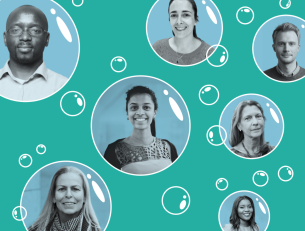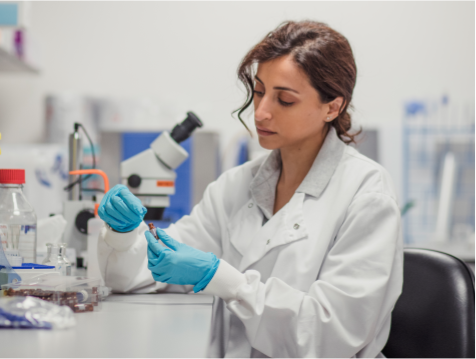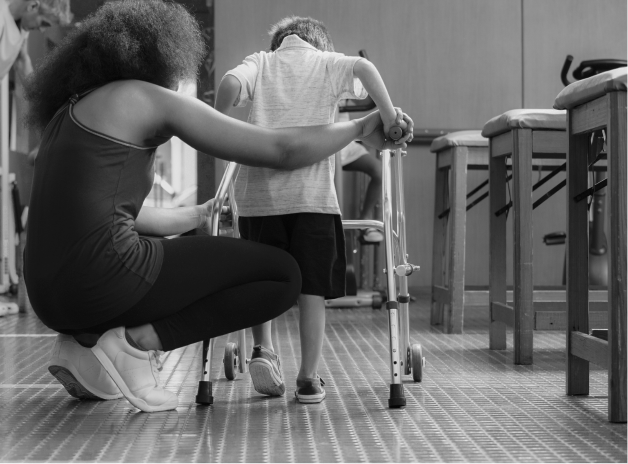From epidemiologists to social scientists, find out about the amazing people at the cutting edge of the fight against not just COVID-19, but all epidemics.
MEET THEMFrom masking up, to staying in, to replacing hugs with Zoom calls, the past year has been hard, but we’re finally starting to see the light at the end of the tunnel. To keep up the positive momentum and continue to stay safe, we need to take it to the next level, a global level. We need to Build A Bigger Bubble, one which includes not just your loved ones, but the whole world. Because none of us is safe until all of us is safe.
In the UK, a number of organisations are already working tirelessy to Build A Bigger Bubble. Read more to find out how!
Let’s make this our Decade of Health, let’s Build A Bigger Bubble.
READ TIME: 10 MINUTES
10 THINGS THE UK IS DOING TO BUILD A BIGGER BUBBLE
READ TIME:10 MINUTES
From masking up, to staying in, to replacing hugs with Zoom calls, the past year has been hard, but we’re finally starting to see the light at the end of the tunnel. To keep up the positive momentum and continue to stay safe, we need to take it to the next level, a global level. We need to Build A Bigger Bubble, one which includes not just your loved ones, but the whole world. Because none of us are safe until all of us is safe.
In the UK, a number of organisations are already working tirelessy to Build A Bigger Bubble. Read more to find out how!
Let’s make this our Decade of Health, let’s Build A Bigger Bubble.
We Are Continuing The Research
World-leading researchers, modern facilities and flexibility mean the Francis Crick Institute is impressively equipped to tackle COVID-19. At the start of the pandemic, labs were rapidly adapted into testing facilities, while scientists pivoted their research to focus on Covid-19. But with the emergence of new variants, research is more important than ever. The Crick Institute is helping to answer key questions, from why the virus is deadly in some people but causes no symptoms in others, to how it’s evolving.

We Are Sharing The Research
Wellcome is advocating for research and data on COVID-19, and future outbreaks, to be shared rapidly and openly between organisations and across borders. This is an affirmation of Wellcome’s 2016 Statement On Data Sharing In Public Health Emergencies, to which many organisations around the world have already pledged their support. This continuing global collaboration will ensure that the World Health Organisation and national health organisations have rapid access to the latest findings, thereby making public health responses quicker and more effective, learning from each other and saving more lives both in the UK and around the world.
We Are Fighting For Vaccinations For All
The Royal Society of Tropical Medicine and Hygiene has recently signed up to the World Health Organisation’s Vaccine Equity Declaration, along with tens of thousands of individuals and nearly 1,500 organisations. The declaration calls on governments and manufacturers to streamline regulation, share knowledge and distribute COVID-19 vaccines and treatments fairly around the world.
We Are Improving Healthcare In Low-Income Countries
A chain is only as strong as its weakest link, so to protect us all against future pandemics, we need to improve health infrastructure in the more pandemic-vulnerable low-income countries. At the Liverpool School of Tropical Medicine, a project spearheaded by Professors Sally Theobald, Miriam Taegtmeyer, Imelda Bates and Dr. Laura Dean is working with partner organisations in Liverpool and Liberia to compare how health systems in both places have dealt with the pandemic. Through sharing research and data, they are learning things that can be applied to improve health outcomes in low-income countries, which will in turn benefit people around the world.
WE ARE SHORING UP VACCINE CONFIDENCE
Misinformation is as contagious as a virus, and in some ways, just as dangerous. A big part of the fight against COVID-19 has been to make sure people have the correct facts about vaccines and information that is relevant to their questions and concerns. Vaccination is crucial in preventing further outbreaks.The London School Of Hygiene & Tropical Medicine’s Vaccine Confidence Project is doing just this. It monitors the public mood around vaccines, tackling early signs of distrust and responding to misinformation and hesitancy with guidance and facts. Because none of us are safe, until all of us are safe.


We Are Collaborating With Other Countries
When it comes to disease control, it’s in everyone’s interests to collaborate and share knowledge.The ten-year partnership between Chipata Central Hospital, Zambia, and NHS Highland, in Scotland, received a new grant through the Tropical Health Education Trust’s Health Worker Action Fund in 2020. Over the last year, the project team has been sharing information on how best to improve infection prevention practices and to support the mental health and wellbeing of frontline staff. The project also aims, through information, stories and advice given through radio programmes, to protect people with chronic conditions which make them more vulnerable to COVID-19.
We Are Preparing For Future Pandemics
It’s not if, but when, the next pandemic emerges. That’s why we need to be ready. The UK Government has funded a Public Health Rapid Support Team led by Public Health England and the London School of Hygiene & Tropical Medicine. Together, they are ready to respond to outbreaks anywhere in the world before they spread. Deployable within 48 hours, the taskforce is headed up by Professor Daniel Bausch and includes epidemiologists, microbiologists, clinical researchers and other experts to keep us all safe.


We Are Continuing To Fight Other Diseases
The battle against pandemics and epidemics doesn’t start and end with COVID-19. All around the world there are other epidemics that impact the health and infrastructure of low-income countries, thereby putting the UK at risk. In 2012, leaders of several prominent global health and development organisations, together with industry partners, met in London and pledged to unite their efforts to support the achievement of the World Health Organization’s (WHO) 2020 goals: to control or eliminate 10 neglected tropical diseases (NTDs). This led to the establishment of the Uniting to Combat Neglected Tropical Diseases (Uniting) partnership. Since then, the partnership has expanded its mission to target 20 NTDs, which affect over 1.7 billion people. The vision of Uniting is to support the WHO’s roadmap and end the epidemic of NTDs by 2030.
We Are Tackling Outbreaks Head On
By tackling outbreaks early, we can limit their spread. Co-led by Professor Martin Antonio and Dr Adam Kucharski, the Centre for Epidemic Preparedness and Response shares insights and innovation from around the world to help tackle epidemics wherever they happen. It aims to ensure that all countries – including the UK – are as prepared as they can be to respond to epidemics, both now and in the future.

We Are Continuing To Fight For Global Health
In September 2020, Action for Global Health reviewed the UK government’s commitments to global health. It found that whilst the UK Government had provided leadership on areas such as family planning and antimicrobial resistance, there remained gaps in healthcare systems and staff. The report laid out a number of ways in which global health spending could achieve a basic level of universal healthcare, including the UK publishing a cross-government global health strategy and devising a roadmap to stop preventable maternal and infant deaths. This improved approach will in turn drive efficiencies in global health expenditure and better safeguard against future pandemics.
The UK is fighting COVID-19 head-on by taking steps to protect everyone, everywhere in the world.
FIND OUT MOREThere are lots of quick and fun ways you get involved and help Build A Bigger Bubble right now – and many of them don’t cost a thing!
GET INVOLVED



